ZESCO to light up Livingstone with the 19th Congress of the Association of Power Utilities of Africa (APUA)
Notice: Undefined index: catFilterList in /home/zambi/public_html/wp-content/plugins/wp-likes/api.php on line 243
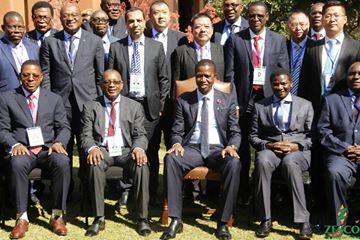
Zambia’s Sixth (6th) Republican President Edgar Chagwa Lungu with Association of Power Utilities of Africa (APUA) delegates in Livingstone
Imagine Jane, a thirty-something, year-old, mother of three, in a remote part of Zambia, flipping the light switch on, in her hut made of poles, mud and grass thatch, and voila! The tiny, rondavelle, instantly lights up inside, as if it is daylight.
Thanks to electricity, she and her family can enjoy modern comforts, like having an electric stove, a television set, a radio, and other appliances that require power.
Picture a similar scenario, in every part of Africa, both rural and urban. “It sounds impossible”, you might say. Well, if the people at the Association of Power Utilities of Africa (APUA), or, Association des Sociétés d’Electricité d’Afrique (ASEA), in French, are to have their way, that is the future! Between 10 and 14 July, 2017, in our beautiful, picturesque, tourist capital,
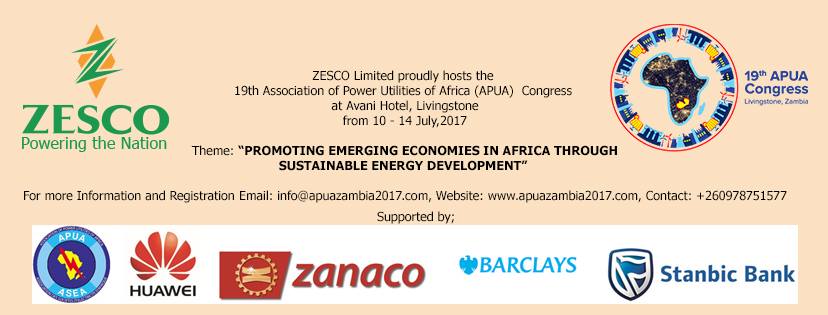
Association of Power Utilities of Africa 2017 Advert
Livingstone, the home of the mighty Victoria Falls, and other world-class tourist attractions and amenities, over 500 delegates from 54 African countries, as well as others from further afield, will gather to discuss the future of the continent’s energy sector.
The meeting, which is an annual gathering, is the Congress of APUA. It will be held at the AVANI Victoria Falls resort, and will be graced by President Edgar Chagwa Lungu, who will officially open it. Zambia will be privileged to host the Congress, under the auspices of our national electricity utility, ZESCO Ltd. The theme is: “Promoting Emerging Economies in Africa Through Sustainable Energy Development”.
During the Congress, ZESCO will carry the Zambian flag higher, by assuming the Presidency of APUA for the next three-years. The Managing Director of ZESCO, Mr. Victor Mulenga Mundende, who until now has been Vice-President, will be formally
inducted as President of APUA, with the huge responsibility of overseeing the growth of the power sector in Africa.
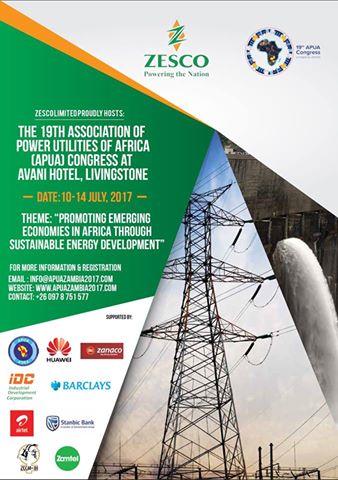
Association of Power Utilities of Africa (APUA) 2017 promotion
APUA is the successor of the Union of Producers, Transporters and Distributors of Electric Power in Africa (UPDEA), which was founded in 1970, and has its headquarters in Abidjan, Côte d’Ivoire. Over the years, UPDEA has undergone transformation, in response to the changing economic and political environment in Africa and the rest of the world.
In 2012, UPDEA was christened as APUA, by agreement of its constituent members, during a meeting held in Algiers, Algeria.
The Mission of APUA is: “… to bring together African power utilities and stakeholders towards making power more accessible, affordable and reliable for the African people”.
APUA is the only African institution for the promotion of power utilities. It is one of the specialized institutions of the African Union Commission, a permanent member of the Executive Council of the African Energy Commission, a permanent member of the Executive Committee and the Management Committee of the African Electro-technical Standardization Commission, an institution conceived and launched by APUA in January 2008, tasked by the African Ministers in charge of Energy.
APUA has a privileged partnership with the African Development Bank, the United Nations Economic Commission for Africa and the New Partnership for Africa Development, among others.
The lack of access to affordable and reliable electricity supply in Africa is a major problem which APUA seeks to address. The Africa Energy Outlook, a Special Report in the 2014 World Energy Outlook series, showed that more than 620 million people in sub-Saharan Africa, or, two-thirds of the population, lived without electricity, and nearly 730 million people relied on dangerous, inefficient forms of cooking.
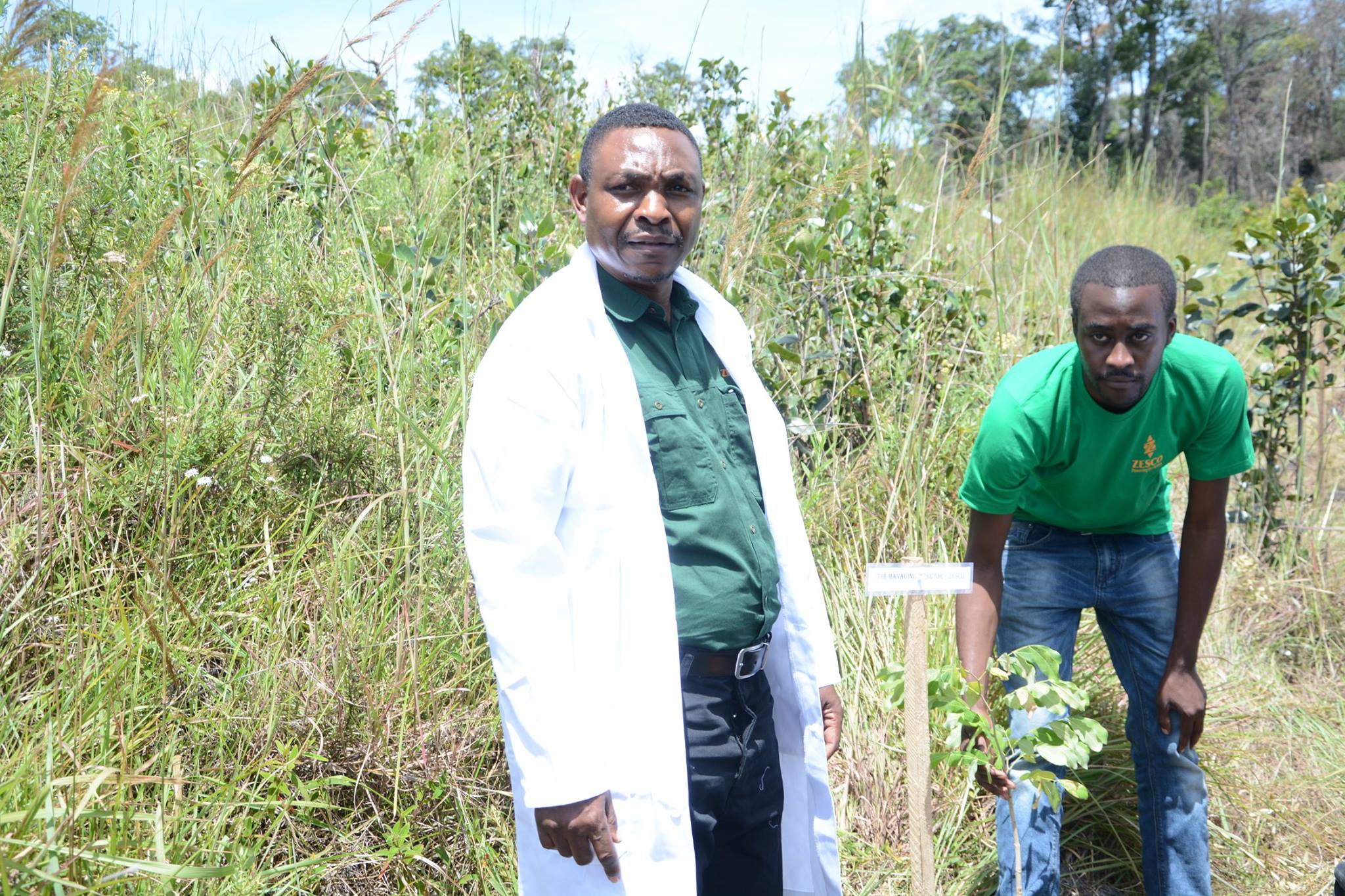
Mr. Changala Nswana, the Director of Strategy and Corporate Services at ZESCO
Mr. Changala Nswana, the Director of Strategy and Corporate Services at ZESCO, said recently, that only about 30 percent of the Zambian population has access to electricity, while the rest rely on charcoal and firewood for cooking and heating, as well as paraffin and candles for lighting. In sharp contrast with this, 88 percent of the population in North Africa has access to electricity.
“We have a lot to learn from our colleagues in North Africa on how they have been able to achieve that. Our membership of APUA presents such an opportunity for sharing knowledge, information and experiences,” Mr. Nswana said.
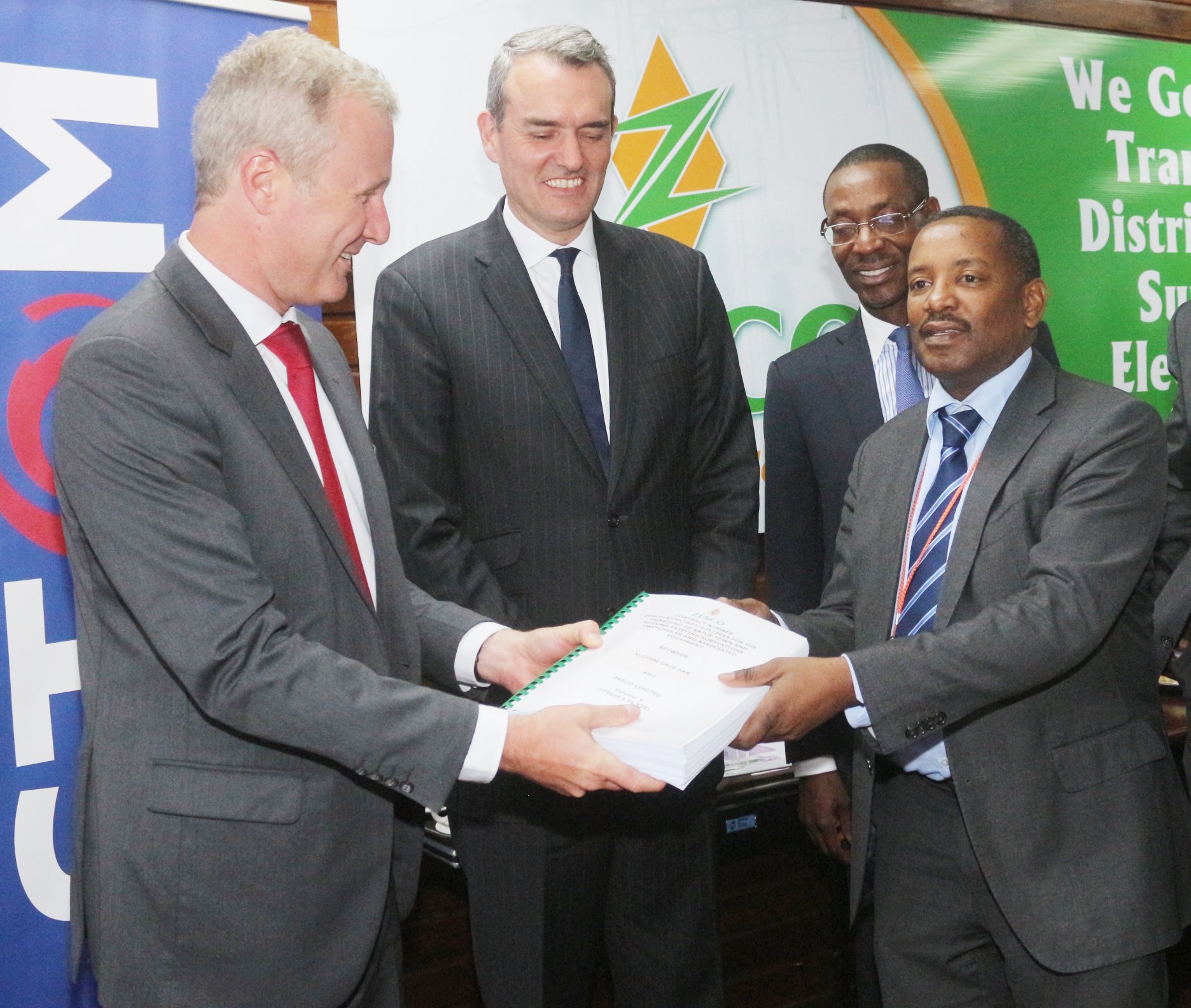
Victor Mundende (right) is ZESCO MD
Mr. Nswana, who is one of the key contact persons on APUA at ZESCO, said the Congress in Livingstone, will offer an opportunity for power utilities in Africa, to network and share experiences on what steps they were taking to achieve the
objective of APUA, which is to make electricity available for both industrial and domestic consumers, reliably and affordably.
He said, in order to be effective and efficient, APUA was organised into five regions, or “power pools”, covering southern, eastern, central, western and north Africa. Zambia belongs to the Southern African Power Pool (SAPP).
It is the ultimate goal of APUA to ensure that electricity can be efficiently and cheaply transported, among the various power pools, through regional interconnectors. What this means, is that eventually, ZESCO in Zambia should be able to easily and efficiently sell electricity to any country in Africa, be it in southern, eastern, central, western or northern Africa. The private power producers in Africa, an emerging growth sector, will also be able to use the same power infrastructure, inspired by APUA, to trade in electricity, within their own countries, or beyond.
Because of Zambia’s membership of the Southern African Power Pool, when the country faced a critical shortage of electricity, due to drought, between 2015 and 2016, ZESCO was able to rely on its sister power utilities in South Africa and Mozambique, to quickly arrange for the emergency importation of electricity to meet the shortfall in the country.
“The routes for importing power from these two countries came through the infrastructure of other operators. Without the efforts of APUA, it would have been a much bigger challenge to get that power here at a reasonable cost,” Mr. Nswana said.
ZESCO has been a long-standing and active member of APUA, having joined in 2003, when it was still called UPDEA. At the moment, ZESCO serves as First Vice President of APUA. It assumed that role three years go. As already stated, the mantle of leadership will be passed on to ZESCO during the Congress in Livingstone, this month, from Angola, which has held the Presidency during the last three years.
“As First Vice-President, ZESCO has been privileged to chair the Scientific Committee of APUA, starting in 2015, which has had three working groups on customer service, renewable energy and industrialisation of the energy sector,” Mr. Nswana said.
The Scientific Committee can be likened to the “heart” of APUA, because it prepares thematic areas that are deliberated upon by delegates at the Congress, which form the basis for policy decisions made during the General Assembly, the highest decision making organ of APUA.
Under the stewardship of ZESCO, the Scientific Committee has held meetings of between 50 and 80 experts, in Lusaka, Dakar, Accra and Johannesburg, where far-reaching recommendations have been made to guide the future of the energy sector in Africa. It is important for members of APUA to attend the Annual Congress because it offers an opportunity for them to assess whether the organisation is on track in meeting its objectives, if the executive is doing its work according to the
mandate given to it by the General Assembly, and to simply understand how the various organs of APUA have been working.
“Progress reports are presented at the Congress, finances are discussed and the general performance of the organisation is discussed,” Mr. Nswana said.
On the sidelines of the Congress, there is an exhibition by manufacturers and suppliers to the energy sector in Africa, as well as various consultants and experts in the global energy business. Therefore, public and private players in the electricity industry in Africa and Zambia, in particular, will be presented with an excellent “one-stop-shop” to meet the leading manufacturers, service providers and financiers in the energy sector, both traditional and renewable.
Leading up to the Congress, ZESCO has also chaired a working group that has been preparing the revised strategic plan for APUA, which will provide the road map for the next five years. In a way, this has been part of the preparation for
ZESCO to assume the Presidency of APUA this month.
“It will be an honour for ZESCO to be elected President of APUA. That is a huge responsibility. As an organisation, we will provide the structure to support APUA,” Mr. Nswana said.
He thanked the Government of President Lungu, through the Ministry of Energy, David Mabumba for the support that it has rendered to ZESCO and for making it possible for the APUA Congress to be held in Lusaka.
It will not be all work, without play, in Livingstone, between July 10 and 14, during the APUA Congress. ZESCO has made sure that the 500, or more, delegates from Africa and beyond, sample the best of Zambian culture, wildlife, tourism attractions, and most important of all, our warm hospitality.
As Jane and her family go to sleep every night, they can rest assured that with APUA, they will be guaranteed affordable and reliable supply of electricity, every day, for 365 days in a year.

Henry Kapata. ZESCO Spokesperson
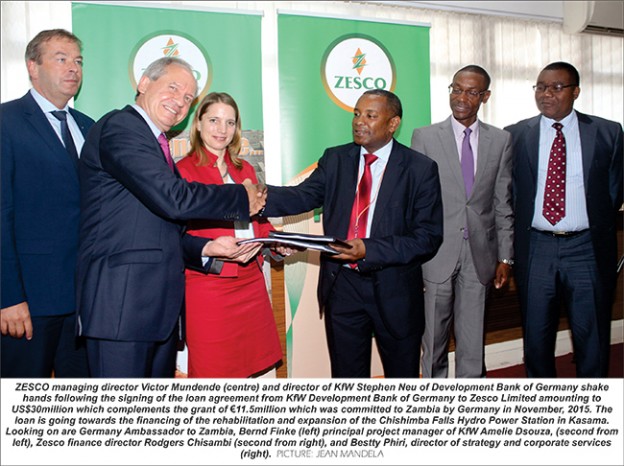
ZESCO-FINKE-Mundende
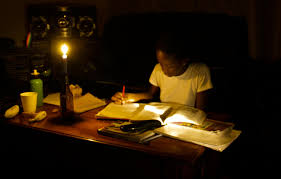
zesco-power



















